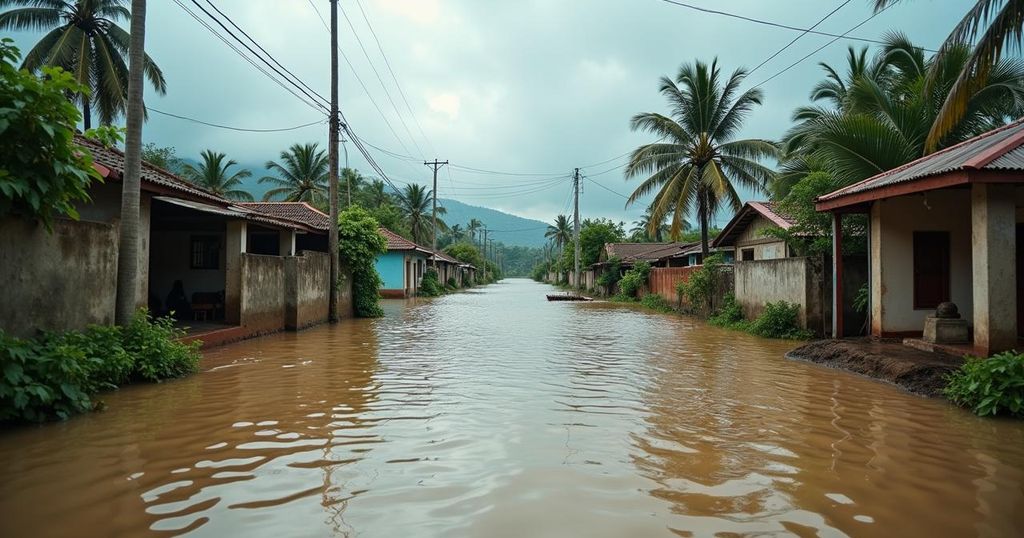Climate Change Catastrophe: The Devastating Flooding in Western Africa

Severe flooding in Western Africa, particularly Nigeria, has resulted in over a thousand deaths and millions affected. The flooding is exacerbated by the region’s vulnerability to climate change and is compounded by infrastructure failures and corruption. Immediate and long-term strategies for disaster management and climate adaptation are urgently needed.
A recent interview on public radio’s Living on Earth, hosted by Steve Curwood and featuring intern Nana Mohammed, highlighted the catastrophic flooding that has recently struck Nigeria and several other West African nations. The extreme floods have claimed over a thousand lives and affected millions across the region, exacerbating an already dire climate emergency. Notable areas include Maiduguri, Nigeria, where the governor reported that up to 2 million people are impacted, leaving many in desperate need of food and shelter. Reports from local journalists capture the harrowing scenes of rescue operations, where families were trapped and children faced serious peril due to the flooding. Isma’il Alfa Abdulrahim, a journalist from Maiduguri, described the chaos firsthand, with over twenty family members affected and numerous rescues conducted amidst life-threatening conditions. The severity of this disaster is being compared to past crises, such as the Boko Haram attacks, indicating the intense disruption to civilian life caused by both conflict and environmental disasters in the region. Climatologist Dr. Vincent Nduka Ojeh provided insights into the role of climate change in the floods, noting that the rainfall intensity far exceeded normal expectations. He expressed concern over the collapse of the Alau dam, a critical infrastructure that had been neglected despite warnings for repairs and which contributed significantly to the flooding disaster. Additionally, the prevailing issues of corruption hinder effective disaster preparedness and response, with funds meant for climate adaptation often being misallocated. Experts argue that Nigeria’s limited financial resources and weak infrastructure increase its vulnerability to climate impacts, necessitating urgent international support and local commitment to adaptation strategies. With forecasts estimating climate-related damages could escalate to $400 billion for developing nations, the call for more substantial assistance from wealthier nations becomes more pressing. This devastating event highlights the need for immediate relief efforts and long-term infrastructure improvements to mitigate future disasters and support affected communities, ensuring that recovery is prioritized over displacement and suffering.
The recent floods in West Africa, particularly in Nigeria, are part of a broader narrative about climate change impacts. The region is characterized by extreme weather events, compounded by poor infrastructure and insufficient disaster preparedness. Vulnerable populations in Nigeria, Mali, Senegal, and Chad face heightened risks due to climate change, which has intensified the frequency and severity of flooding and other disasters. This situation is further complicated by socioeconomic factors, including corruption and limited government resources, impeding effective disaster response and adaptation measures. The global community’s role, especially in providing financial support to developing nations, is crucial in addressing these challenges and is becoming increasingly urgent as the frequency of climate-related disasters rises.
The flooding in Western Africa represents a tragic intersection of climate change and socio-political challenges. Over a thousand lives have been lost, with millions affected, underscoring the urgent need for effective disaster management and resilient infrastructure. The neglect of critical infrastructure such as the Alau dam, coupled with the lasting impacts of conflict, exemplifies the daunting challenges faced by vulnerable populations in the region. As climate change continues to pose severe risks, the necessity for international support and financial assistance for adaptation strategies becomes evident. The efforts to mitigate future disasters must focus not only on immediate relief but also on building a robust framework for climate resilience in affected communities.
Original Source: insideclimatenews.org








